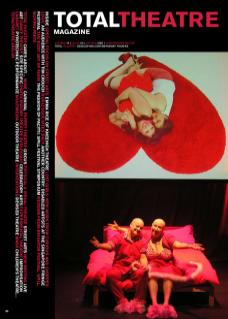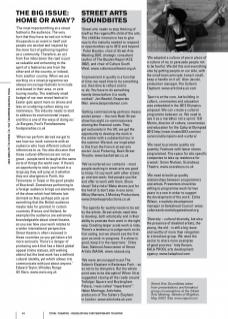‘The most important thing at a street festival is the audience. The very fact that they have turned out in their thousands is an event in itself and people are excited and inspired by the mere fact of gathering together as a community. Therefore, an act from five miles down the road is just as valuable and enhancing to the spirit of a festival as one from the other end of the country, or indeed, from another country. When we are working on a street programme we always encourage festivals to include acts based in their area, or acts touring nearby. The relatively small budget of our own street festival in Exeter gets spent more on shows and less on scattering carbon along our motorways. The industry needs to start to address its environmental impact, and this is one of the ways of doing so.’ Jo Burgess, Fool’s Paradise www. foolsparadise.co.uk
‘When we perform abroad we get to see how our work connects with an audience who have different cultural references to us. You also discover that those cultural differences are not so great – people tend to laugh at the same sorts of things the world over. If there’s an opportunity to stick your head in a large pig they will jump at it whether they are aborigines in Perth, the Taiwanese in Taipei or the good people of Bracknell. Sometimes performing to a foreign audience brings out elements of the show which had hitherto lain dormant as they perhaps pick up on something that the British audience maybe take for granted. In certain countries (France and Holland, for example) the audience are extremely knowledgeable about street theatre, so you see how your work relates to a wider international perspective. Street theatre is often reviewed in these countries so you get taken a bit more seriously. There’s a danger of producing work that has a bland global appeal (mime statues, stilt walking aliens) but the best work has a defined cultural identity, yet which allows it to communicate with just about anyone.’ Edward Taylor, Whalley Range All Stars. www.wars.org.uk
Street Arts Soundbites
‘Street arts needs to stop thinking of itself as the ragamuffin child of the arts. The childlike innocence has to give way to the maturity needed to respond to opportunities up to 2012 and beyond ’ Peter Boyden, chair of Street Arts Meeting 2007, strategic consultant (author of The Boyden Report ACE 2002), and chair of Culture South West. www.culturesouthwest.org.uk
‘Improvement in quality is a function of time: we need time to try something out, then time to reflect and to re-do. You have to do something twenty times before it is really cooked.’ Jon Beedel, Desperate Men. www.desperatemen.com
‘Getting commissioning partners means pester power – the new Bash Street show has eight co-commissioners sharing the financial costs. They get exclusivity in the UK; we get the opportunity to develop the work in the winter with a substantial tour in the summer. We took our inspiration in this from the French street arts sector’ JoJo Pickering, Bash Street Theatre. www.bashstreet.co.uk
‘We’ve nurtured our contacts – most people working in street arts are good to know. I’d say work with other artists: go and see work; find people you like and offer to work with them. Share ideas! Take risks! Make shows just for the hell of it; don’t stay in one zone.’ Mikey Martens, 3 Monkey Productions. www.3monkeyproductions.co.uk
‘The agenda for quality needs to be set by the artists. Street artists need time to develop, both artistically and in their ability to promote their work in the right way. Creating larger scale work is risky. There’s a tendency to judge work on its first outing, but we should see the first year as work-in-progress. If a show is good, keep it in the repertoire.’ Chloe Dear, National Association of Street Artists (NASA). www.nasauk.org
‘We were encouraged to put The Sultan’s Elephant in Battersea Park – so as not to be disruptive. But the whole point was to be disruptive! When I first suggested closing all the roads around Trafalgar Square and Buckingham Palace, I was called “impertinent”.’ Helen Marriage, Artichoke, producers of The Sultan’s Elephant in London. www.artichoke.uk.com
‘We adopted a culture of yes in place of a culture of no; to persuade people not to be fearful. We did this and everything else by getting people on our side, with the small team principle: keep it small, keep a handle on it all.’ Alan Jacobi, production manager, The Sultan’s Elephant. www.artichoke.uk.com
‘Sport is at the core, but building in culture, ceremonies and education was embedded in the 2012 Olympics proposal. We can create a cultural programme between us. We need to see it as a marathon not a sprint.’ Bill Morris, director of culture, ceremonies and education for the Cultural Olympiad 2012 http://main.london2012.com/en/ ourvision/olympism+and+culture/
‘We need to promote quality not quantity. Festivals with fewer shows programmed. The space for site specific companies to take up residence for a week.’ Soren Nielsen, Scarabeus Theatre. www.scarabeus.co.uk
‘We need to build up quality relationships between programmers and artists. Presenters should be willing to programme work for two years in a row in order to support the development of the work.’ Ednie Wilson, creativity development manager at Gateshead Council. www. cultureandcreativitygateshead.org
‘Diversity – cultural diversity, but also the presence of disabled artists, the young, the old – is still a big issue and worthy of more than relegation to a breakout group. We need the sector to share more examples of good practice.’ Indy Hunjan, KALA PHOOL arts development agency. www.kalaphool.com
Street Arts Soundbites taken from presentations and breakout group conversations at the Street Arts Meeting, Streets of Brighton, May 2007. See www.zapuk.com

